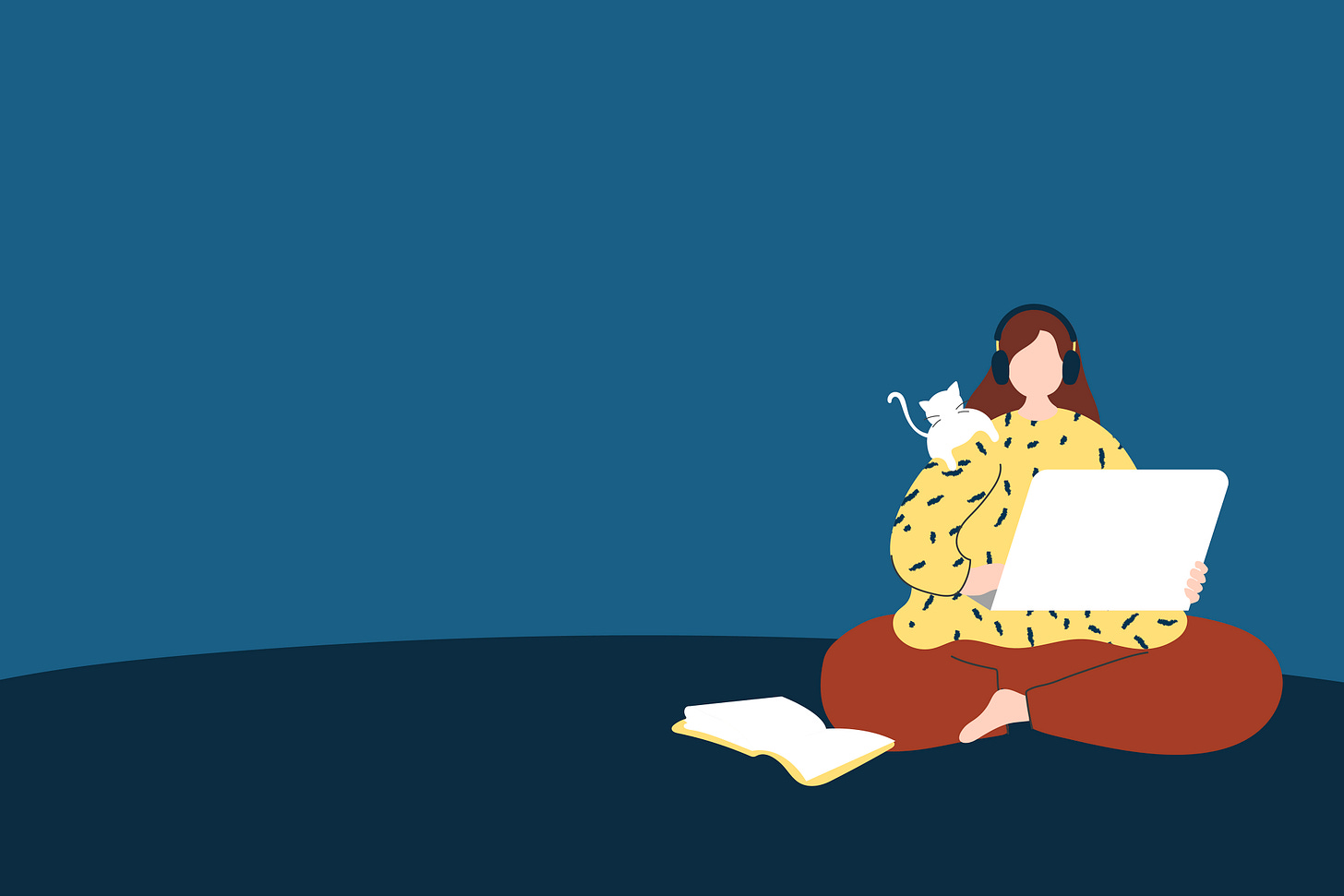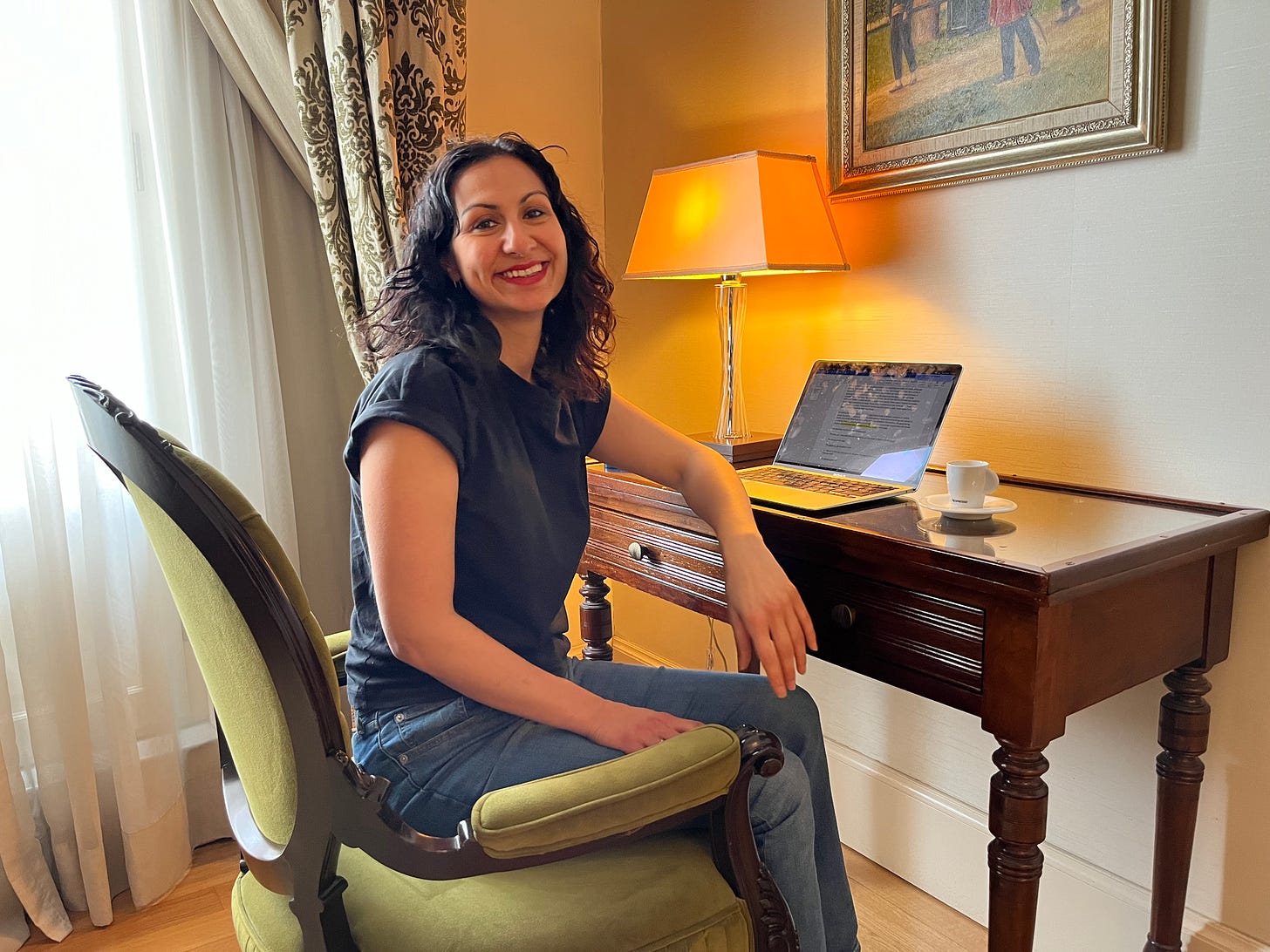Hi everyone,
This week’s newsletter is inspired by a recent conversation I had with a friend who is wanting to get back into writing but feeling paralysed by the process. It got me thinking about what compels me to write and the tips and tricks I’ve learnt along the way to make it easier. So if you’ve been wanting to write more, or indeed are thinking of starting a new creative project — these suggestions are applicable to either — I hope you find it useful!
Ever since I was a small child, I’ve spent a significant amount of my time writing. I penned short stories in primary school, I kept an angst-ridden diary throughout my teens and by the time I hit my twenties I was writing policy documents and press releases in a professional capacity. In my thirties, I started exploring more creative forms such as food and travel writing and my forties have piqued my interest in writing fiction.
All of this feels kind of surprising to me as, honestly, I find writing a bit of a slog.
I struggle with the isolation and I’m truly terrible at grammar. I write slowly compared to many of my contemporaries (or so it feels, anyway) and am lazy at proofreading. I often think what I’ve written is quite basic so it always a surprise when people tell me they enjoy it. And I frequently assume that no one could possibly be interested in anything I’ve got to say.
I share all this because I think there can sometimes be a false perception about what it takes to write and how people feel about their own writing. But once you talk to enough authors you learn that — with the exception of a lucky few — most find the writing process challenging. Those that excel at it have simply learned the tools to manage the hardest bits i.e. just sitting down and starting to write.
I’m often approached by people asking me to look over a book proposal or to talk about a new writing project and I always have the same advice — if you feel you have something to share with the world, just do it. You will live with angst and regret if you don’t. But if you need some help getting started I highly recommend buying The Artist’s Way and committing to doing the 12 week course. I’ve done it twice so far, in 2012 and then in 2022 and it has helped me immensely.
In addition to that, here’s some more advice I’ve gleaned along the way
It’s never the right time, you just have to start.
There is always something better or more important to do than write. The perfect time never arrives. Once you realise that, you’ll start to see that in order to write you have to start putting aside small blocks of time and then guard these with all your might! After a while, this becomes a habit and gets easier.
One tool that can help when you are starting out is to join a writers’ group, either online or in person. For example, every so often,
runs an online Writer’s Hour on Sunday afternoons on her Substack for people to come together and write. It’s great if you want some moral support and accountability.Believe in your work, even if no one else does.
Like many creative industries, the publishing industry is a business, driven by profit. This means it can be risk-averse and often wants to replicate earlier successes so ends up publishing lots of stuff that feels the same. This makes it hard for new ideas to break through. To give you an example, ten years ago when I first wrote a proposal for The Saffron Tales, I sent it to 8 agents and they all rejected it. The mix of politics, food and travel was very confusing for them. I was frequently asked questions like “where would it sit on a shop shelf?” and Iran felt like a dangerous curveball.
It was deeply demoralising but I knew the idea was a good one. So I spent the best part of a year thinking about how I could demonstrate to publishers that it would work. As part of this, I launched a Kickstarter to travel to Iran and do some of the research, I started a blog and I worked as the manager of a food charity. I resubmitted my proposal a year later, with this new material and sent it to just one agent. She got back to me the same day, we signed a contract a week later and the book went on to generate a bidding war between four of the biggest UK publishing houses. The rest, as they say, is history.
I share all this because when I first got those rejections, I could have easily concluded that my idea wasn’t right, or that I wasn’t good enough to write it. In fact, it was just that the people I was pitching needed convincing. You really have to be the biggest advocate for your ideas, especially if you are a first time author but if you are willing to put in the effort to do that, eventually someone will believe you.
Don’t let perfect be the enemy of the good
At a literary festival a few years ago I remember hearing a novelist say that she likes to write when drunk and edit when sober. It made me laugh as sometimes it can feel so crippling trying to write a sentence when your inner critic is kicking off. I can imagine that for some, a drink or two could make that process feel much more enjoyable. I personally can’t write after I’ve been drinking and I’m certainly not suggesting you make it a habit, but I share this story as a reminder that you have to find a way to navigate silence the little voice in your head which tells you that you’re not good enough or the work isn’t good enough. For me, the only way through is to not think that what I’m writing is the final version of anything and just concentrate on getting something down. You can always come back and edit later. Freestyle journaling such as doing Morning Pages can be really good way of practising this.
Get off social media if it’s negatively impacting you.
I’ve had to dramatically reduce the amount of time I spend on social media in recent years as Instagram was making me feel so inadequate about my work. This led to feeling unconfident and then paralysed so I couldn’t write at all. If social media works for you — great! And if you need to be on it for work, I get it. But, if it doesn’t, I highly recommend reducing the hours you spend on it in order to make time for your writing (or other creative pursuits). Not only does it rid you of comparison shame, stopping scrolling also frees up your creative headspace which can help you get words on the page.
If it’s boring to write, it’s boring to read.
As a writer, I’ve come to trust this instinct — if you are pushing through a paragraph feeling bored, then the reader will probably feel that way too. Often this happens when I am thinking too much about what I think the reader wants, as opposed to what I want to say. Part of this is also about voice, once you get the confidence to write in your own voice, writing stops feeling so much like a chore and more like a fun opportunity to share your thoughts as if you were talking to someone sitting in the same room.
So what to do if you get that weary feeling when writing? Hit pause. Step away from the page and seek inspiration elsewhere. Take a walk, do a workout, listen to some music, cook something, go to a gallery, watch a movie — anything to just give your brain some space. Trust me, with a break, it will work out how to do things better. Once you’ve come back to the page, ask yourself how could you be more authentic in what you are writing? Often, when you stop trying to please an imaginary reader, it becomes easier to write.
Don’t tell too many people your ideas at first
One of the most challenging aspects of starting a new creative project is dealing with people’s reactions. It can be hard to articulate an idea when it is still emerging and as such we don’t always do it well. Then people can look confused or uninspired by what we’ve said which can really dent creative confidence. I’ve learnt to share very little about my creative projects until they are almost finished. Sometimes hearing a simple pause and “oh, right” can plunge me into insecurity. There’s magic at work when any creative project is being brought into the world. Keep that magic to yourself and only tell people who you are certain will be enthusiastic cheerleaders in the early stages.
Write regularly and set micro-goals
The more writing becomes part of your daily or weekly routine, the easier it becomes. When I am writing my books or an article, I set a goal of writing 750 words a day. I honestly don’t think I can produce more good words than that in a day! (I used to do less and that’s OK too - Hemingway had a daily goal of 500 words a day and apparently James Joyce wrote just 90 words a day). The key is consistency. Write 500 words a day, five times a week, for eight months and you have the first draft of book. Breaking writing down into small goals can stop it being overwhelming and also helps you mark and reward your progress.
I hope these small ideas will help you with starting any writing or other creative projects. Do you have any tips that you use? I’d love to know so please share in the comments.
Yasmin xx









Hi Yasmin, this was great to read. Even though, I am not a writer, I enjoyed the tips shared. What is your process for writing this newsletter. Do you find that there is less "pressure" for this sort of content to write? Does it come easier for you to write this and decide on the topics and themes?
I have only ever written for work, but more and more I feel an urge to write something more personal, I always reign it in, afraid of letting what out I don't know, I really have nothing to hide, just lots I want to share. Saving your post as inspiration to help me get started.